💳 Open a Business Bank Account in Europe – 2025 Guide for Foreign Entrepreneurs
In 2025, Europe continues to be one of the most attractive destinations for global entrepreneurs, freelancers, and remote companies looking to open a secure, scalable, and compliant business bank account. Whether you're forming an EU-based company via e-residency, expanding your SaaS startup, or managing global vendor payments, choosing the right banking destination can significantly impact your operational efficiency and tax structure.
With a rise in cross-border fintechs, evolving KYC/AML regulations, and the need for remote-friendly, multi-currency solutions, this guide breaks down the most relevant countries, banks, and legal requirements across Europe — built specifically for non-resident founders and borderless businesses in 2025.
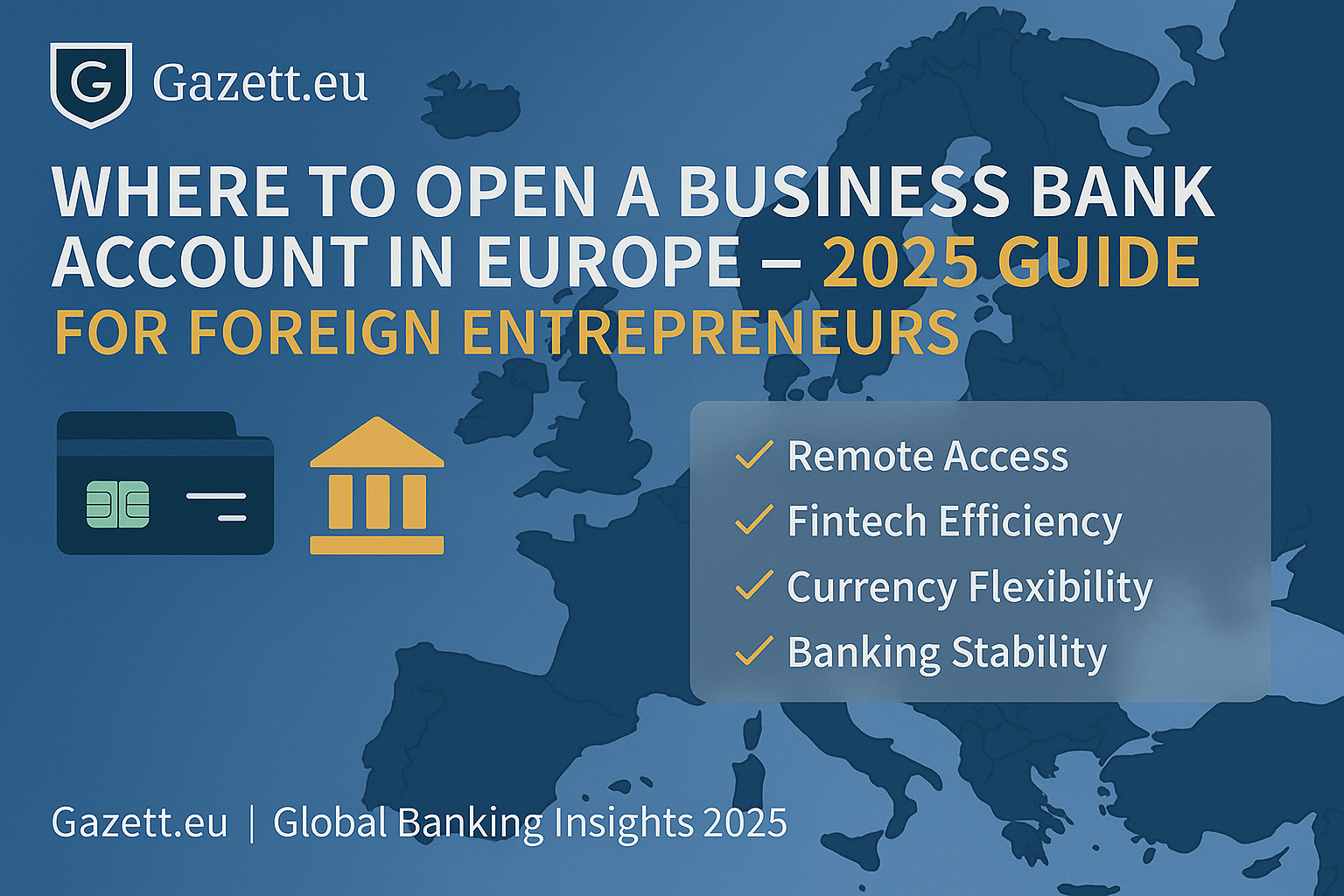
📷 Infographic: Top Countries for Business Banking in Europe – Remote Access, Fintech Support & Regulatory Ease (2025) | Gazett.eu
📚 Article Overview
- 1. Introduction: Why This Guide Matters in 2025 💡
- 2. What Foreign Entrepreneurs Need to Know Before Opening a Business Bank Account 📄
- 3. Estonia – The E-Residency Powerhouse for Remote Banking 🇪🇪
- 4. Germany – Traditional Banking Strength in the EU Core 🇩🇪
- 5. Netherlands – Strategic Gateway with Hybrid Banking 🇳🇱
- 6. Switzerland – Stability, Privacy, and Multi-Currency Banking 🇨🇭
- 7. United Kingdom – Fintech Leadership + Global Access 🇬🇧
- 8. Traditional Banks vs Fintech: Which Works Better in 2025? 💳
- 9. Common Requirements: What You’ll Need to Open an Account 📂
- 10. Comparative Matrix + Decision Guide for Entrepreneurs 📊
- 11. Conclusion + Investor Tip + Visual Summary 💼
What Foreign Entrepreneurs Need to Know Before Opening a Business Bank Account 📄
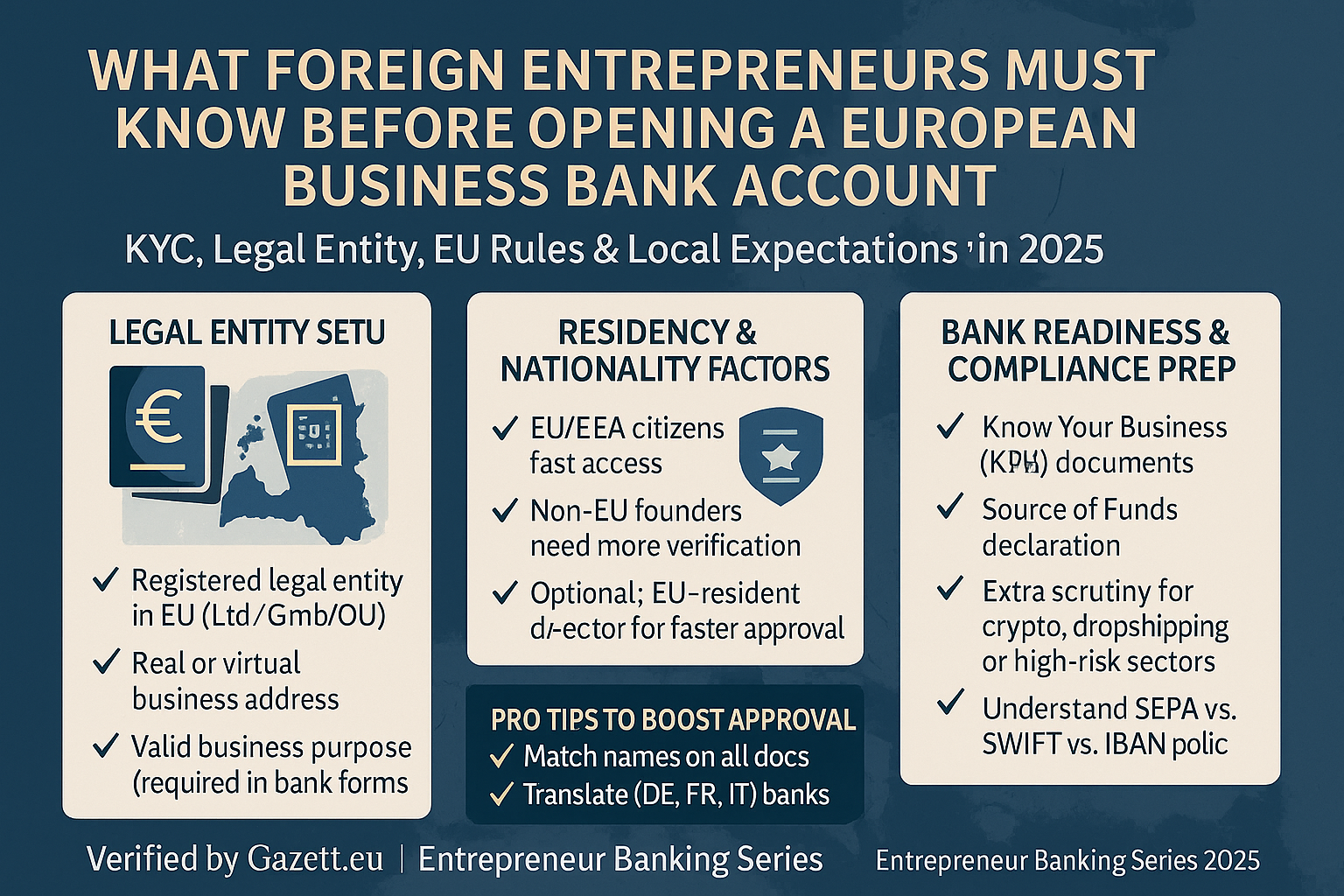
📷 Infographic: Pre-requisites and risks for non-resident entrepreneurs opening EU business accounts | Gazett.eu
✔️ You don’t need to be an EU citizen to open a business account in Europe, but you must follow strict KYC rules.
✔️ Most banks require your company to be registered in the EU or EEA before initiating account setup.
✔️ Residency-friendly countries (e.g., Estonia, UK) allow remote onboarding; others require in-person visits.
✔️ Fintech platforms are much faster but may lack features like cash deposits or cheques.
In 2025, foreign entrepreneurs face a more structured but also more accessible environment for banking in Europe. Thanks to digital identity platforms, open banking APIs, and evolving KYC laws, most countries now support some form of cross-border onboarding. However, compliance burdens have also increased. Banks require proof of genuine economic activity, business purpose, and sometimes local representation — especially in countries like Germany or Switzerland.
As seen in our earlier coverage on EU corporate structuring, selecting the right country isn’t just about low tax — it’s about **banking flexibility, documentation clarity, and speed of execution**.
Estonia – The E-Residency Powerhouse for Remote Banking 🇪🇪
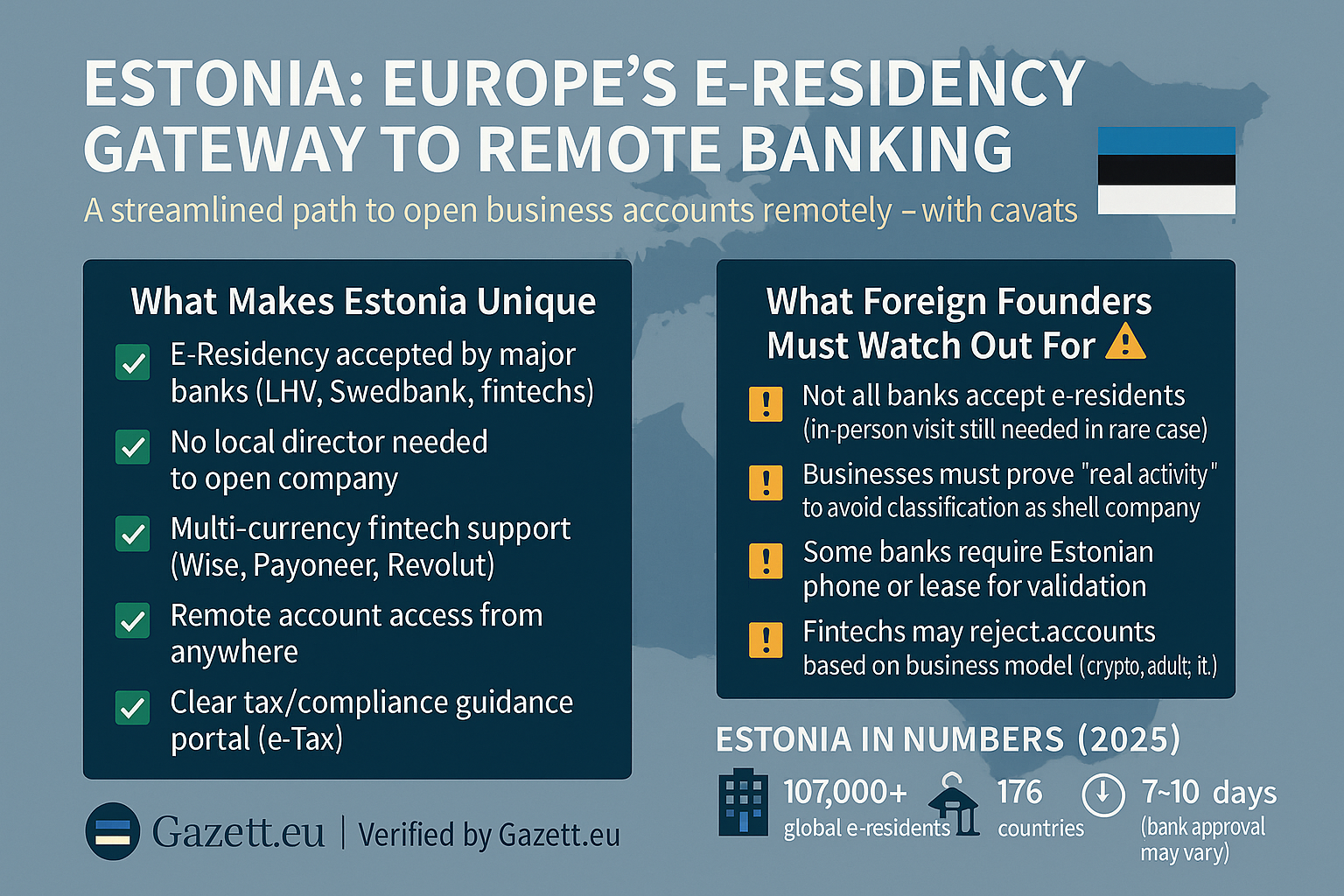
📷 Infographic: Estonia's remote banking + e-residency structure for founders worldwide | Gazett.eu
✅ E-Residency Program: Allows non-EU citizens to start an Estonian company and access EU banking remotely.
✅ Remote Setup: Company + banking setup can be completed without physical presence.
✅ Banking Options: LHV, SEB, Wise, Payoneer (for virtual IBANs).
✅ Ideal For: Freelancers, SaaS founders, consultants, and global remote teams.
Estonia revolutionized cross-border entrepreneurship with its e-Residency program, which now boasts over 100,000 e-residents globally. The initiative allows you to incorporate a private limited company fully online, manage your operations remotely, and access business banking — without ever stepping foot in the country.
Business banking is typically handled through a hybrid of fintech and traditional services. While Wise and Payoneer offer fast IBAN issuance for EUR transactions, many e-residents also choose LHV or SEB for a more conventional EU business account. This flexibility, paired with low bureaucracy and fast registration, has made Estonia the go-to destination for remote-first founders in 2025.
Germany – Traditional Banking Strength in the EU Core 🇩🇪
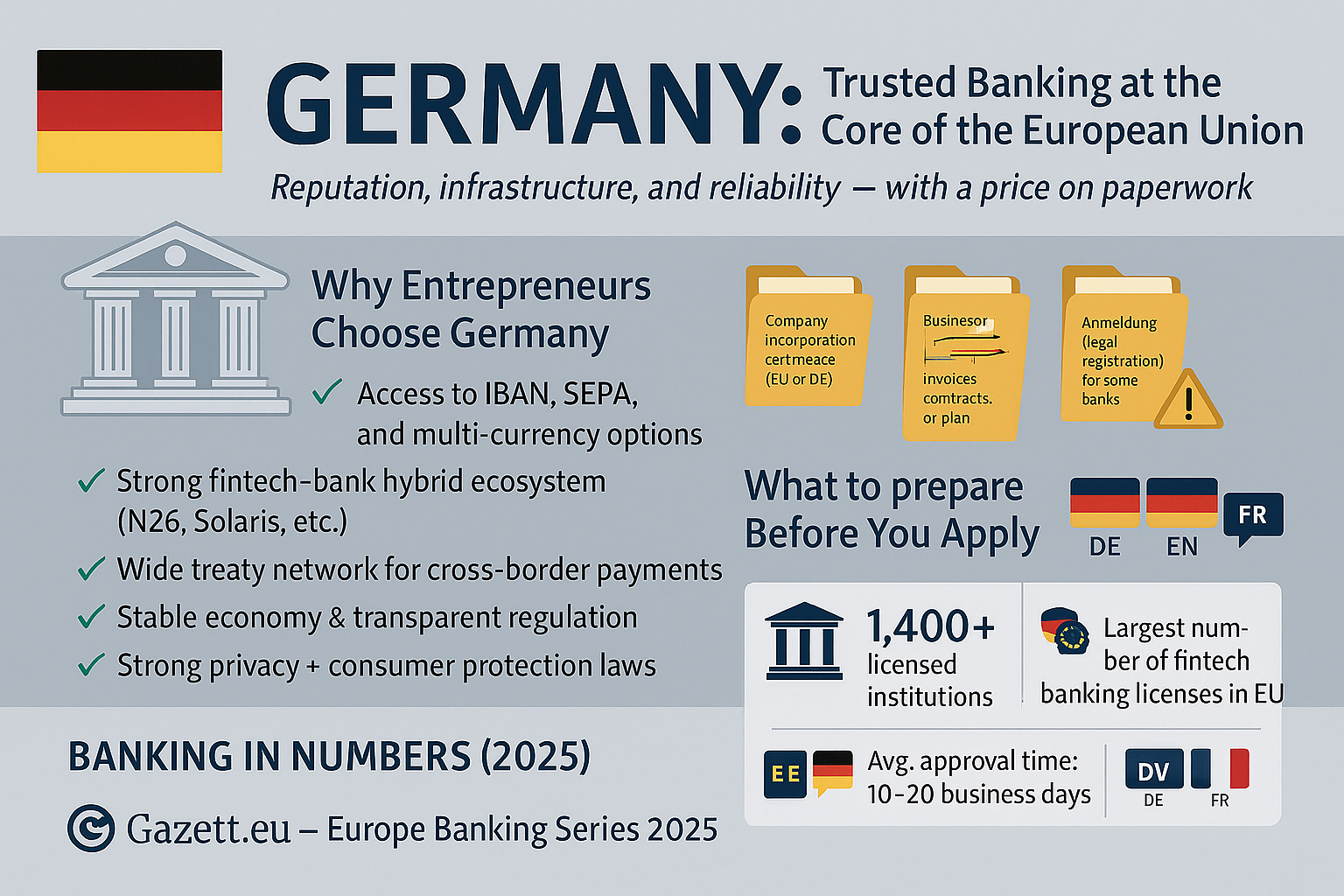
📷 Infographic: Business account opening in Germany for global entrepreneurs | Gazett.eu
✅ Banking Reputation: Known for financial reliability and institutional strength.
✅ Banking Options: Deutsche Bank, Commerzbank, Sparkasse, N26 (digital-first).
✅ Documents Required: Company registration, managing director ID, and proof of business activity.
✅ Ideal For: EU-based startups, GmbH entities, and credibility-focused businesses.
Germany remains a cornerstone of European business banking — offering unmatched regulatory robustness, high credibility, and access to one of the world’s largest consumer economies. Although the process is more traditional than fintech-driven countries like Estonia or the UK, opening an account in Germany adds legitimacy and regional confidence to your venture.
While many banks require an in-person visit (especially for GmbH accounts), Germany also offers reliable digital options like N26 Business, particularly for freelancers and sole proprietors. Businesses with operational ties to the DACH region (Germany, Austria, Switzerland) often prefer Germany for its deep EU connections and regulatory clarity.
🔗 Also Read: How Europe’s Bureaucratic Stability Shapes Economic Trust (2025)
Netherlands – Strategic Gateway with Hybrid Banking 🇳🇱
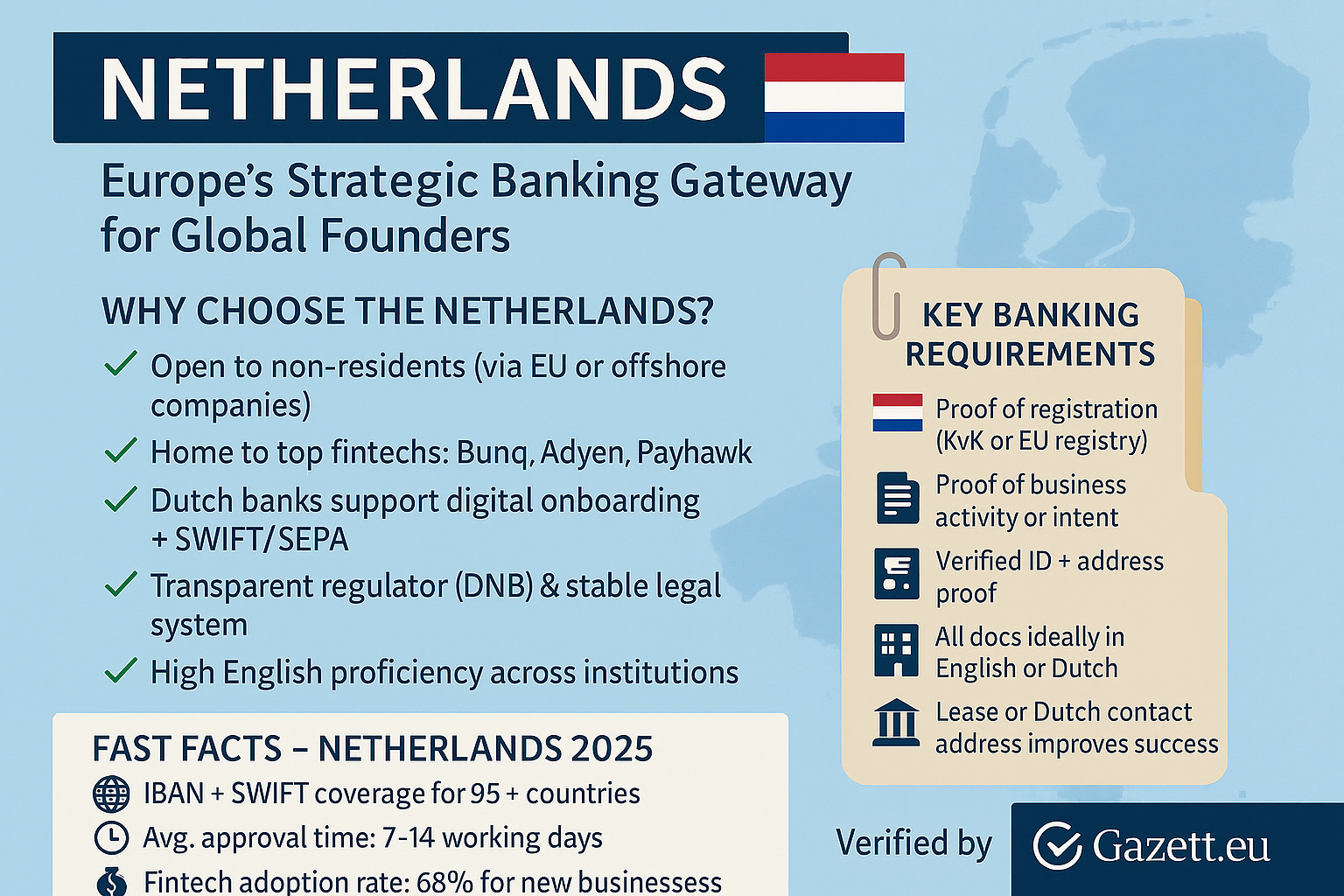
📷 Infographic: Dutch banking system for foreign founders and SMEs | Gazett.eu
✅ Banking Options: ING, ABN AMRO, Rabobank for traditional; Bunq and Revolut Business for digital.
✅ Business Friendliness: Known for welcoming international companies and robust legal protection.
✅ Ease of Doing Business: Remote-friendly setup for some fintechs; in-person for most banks.
✅ Ideal For: International companies, e-commerce startups, and EU VAT-holding entities.
The Netherlands offers a balance of global connectivity, transparent tax rules, and bilingual infrastructure that attracts thousands of foreign entrepreneurs each year. The Dutch Chamber of Commerce (KVK) makes company registration relatively efficient, especially for holding companies, logistics setups, and tech scale-ups.
Traditional players like ING and ABN AMRO offer solid service for local and EU-bound firms, while fintechs like Bunq allow remote-friendly onboarding with multi-currency IBANs and virtual tools. However, stricter compliance checks have been enforced post-2024, especially for non-EU founders, so a strong business case is essential.
🔗 Explore Related: Strategic Hubs of Europe: Investment Trends in 2025
Switzerland – Stability, Privacy, and Multi-Currency Banking 🇨🇭
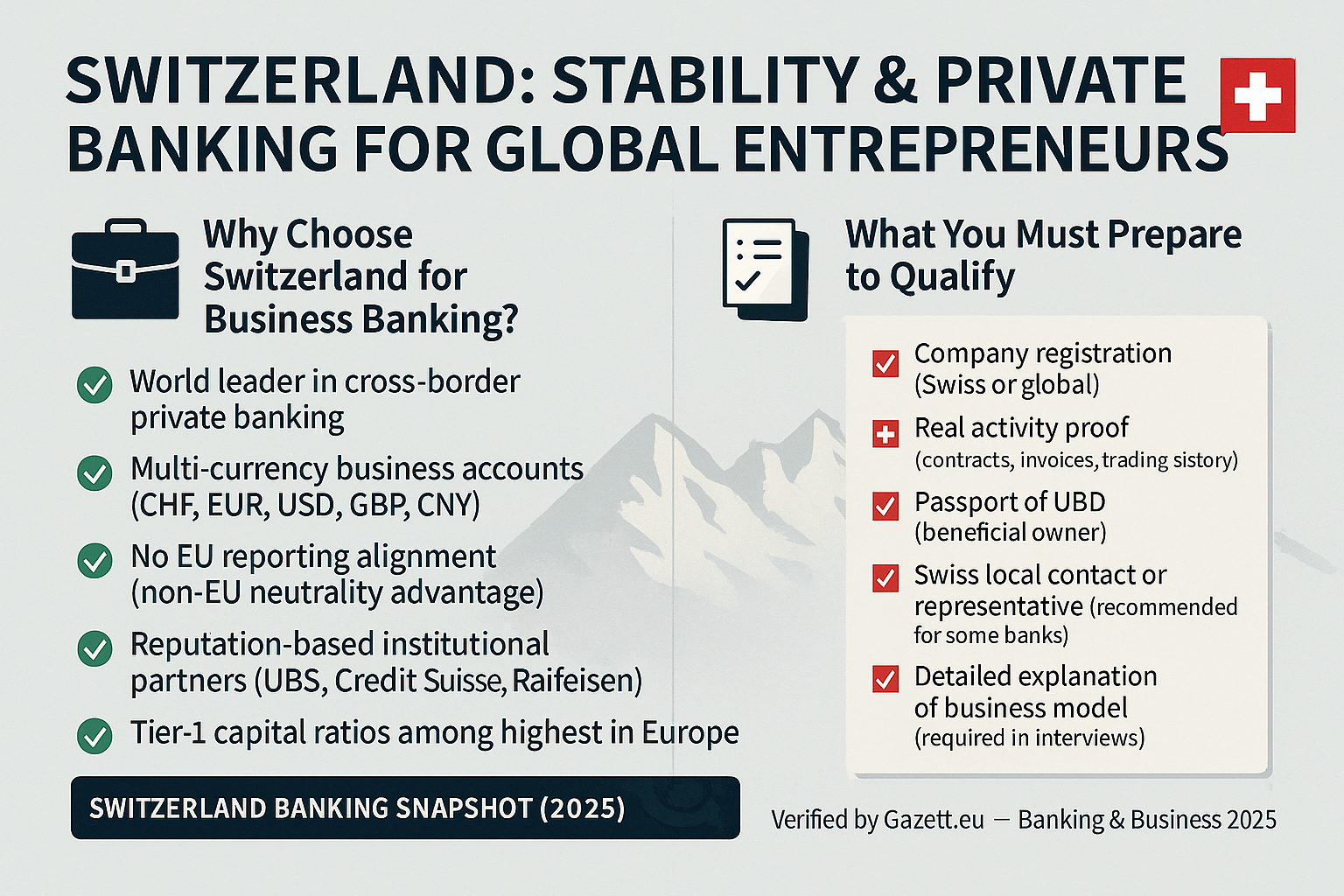
📷 Infographic: Swiss corporate banking – credibility, privacy & global currency setup | Gazett.eu
✅ High Reputation: Switzerland is known for secure, stable, and discreet banking solutions.
✅ Multi-Currency Accounts: Most business accounts offer CHF, EUR, USD, GBP support by default.
✅ Key Banks: UBS, Credit Suisse, PostFinance, Neon (limited SME fintech).
✅ Ideal For: Asset-heavy businesses, trading companies, and cross-border wealth structures.
Switzerland remains one of the most prestigious banking jurisdictions in the world — offering unparalleled credibility, global recognition, and a multi-currency ecosystem built for asset security. While it is not part of the EU, it maintains bilateral treaties and remains compliant with international financial regulations including FATCA and OECD standards.
Opening a business account often requires a local company structure (e.g., AG or GmbH) and physical onboarding. For global entrepreneurs with wealth management goals, Swiss banking allows diversified portfolio structures alongside traditional corporate finance tools. Fintech options are limited but improving, especially for SMEs and startups operating in logistics or trade finance.
🔗 Related Report: Best Countries in Europe to Set Up a Holding Company (2025)
United Kingdom – Fintech Leadership + Global Access 🇬🇧
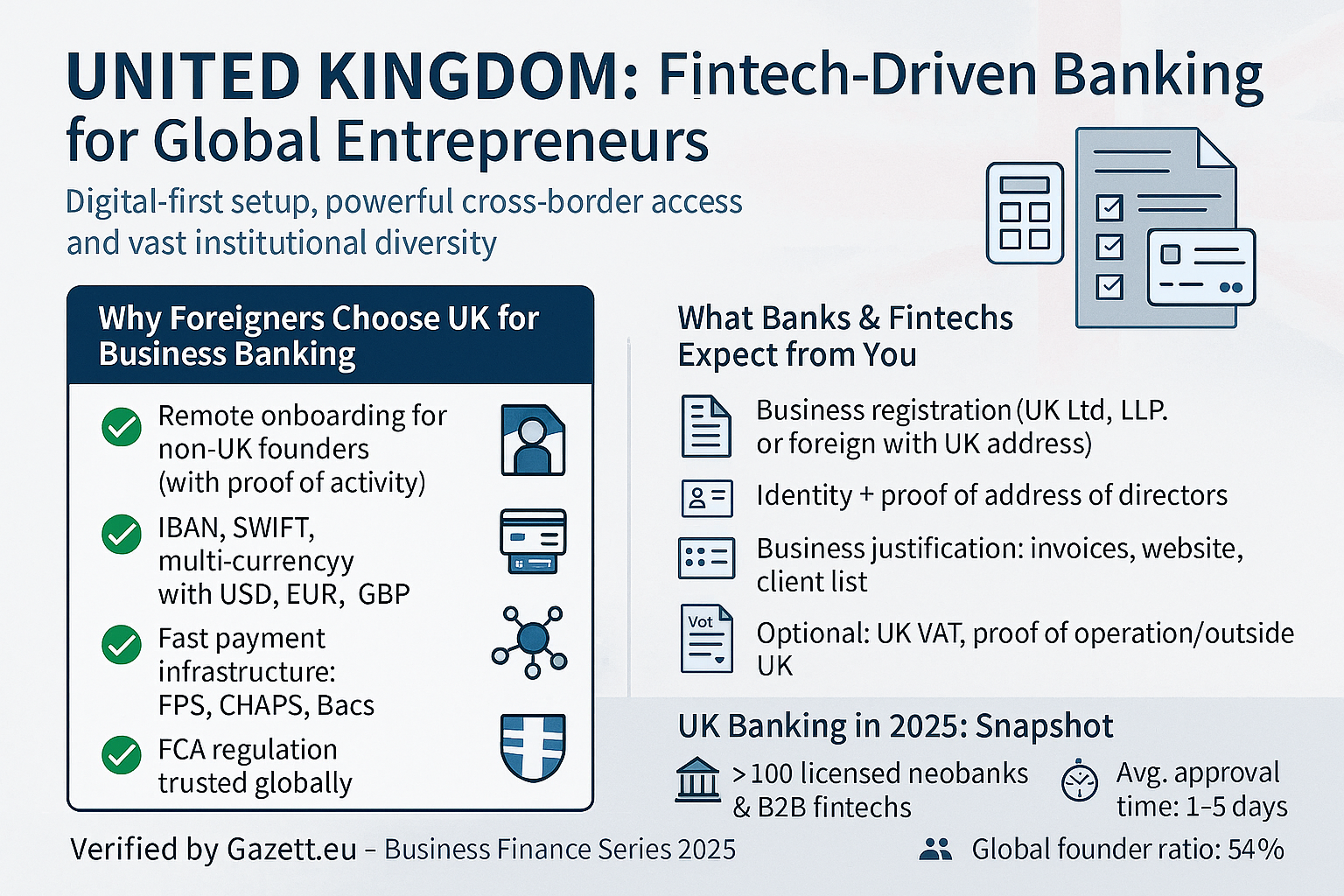
📷 Infographic: UK’s fintech-friendly environment for global business accounts (2025) | Gazett.eu
✅ Top Fintech Environment: London remains a global leader in challenger banking and API-based finance.
✅ Remote-Friendly: Easy to open accounts with no in-person requirements for many platforms.
✅ Banking Options: Revolut Business, Tide, Starling Bank, HSBC UK, Barclays Business.
✅ Ideal For: Freelancers, agencies, remote-first firms, e-commerce, and tech exporters.
Despite leaving the EU, the UK has doubled down on fintech innovation — building one of the most seamless ecosystems for international businesses to open accounts, integrate payment APIs, and manage global operations. In 2025, platforms like Revolut, Starling, and Tide offer rapid onboarding for startups, freelancers, and growing companies with no physical presence required.
Traditional banks like HSBC and Barclays still play a strong role, especially for firms with domestic teams, VAT liabilities, or credit requirements. With full multi-currency capabilities and fast GBP/EUR transfers, the UK remains a top choice for non-resident founders — especially those targeting both EU and Commonwealth markets.
🔗 Featured: Eastern Europe’s Rise as New Factory Hubs – 2025
Traditional Banks vs Fintech: Which Works Better in 2025? 💳
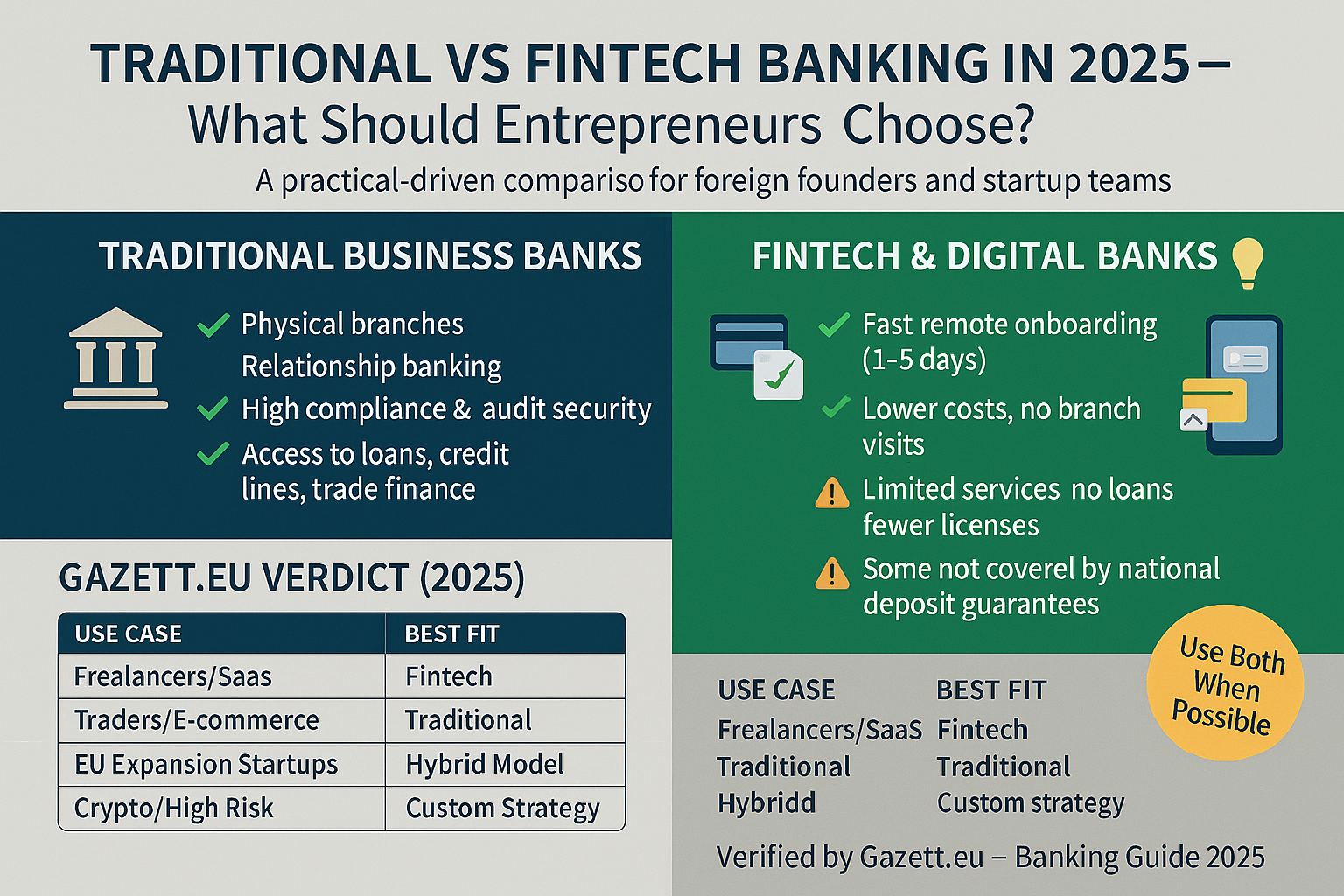
📷 Infographic: Pros & cons of traditional EU banks vs fintechs for foreign entrepreneurs | Gazett.eu
In 2025, the line between traditional banking and fintechs is increasingly blurred. While legacy banks continue to dominate regulated lending and credit operations, fintechs have emerged as the preferred option for quick onboarding, lower fees, and modern integrations like invoicing, API access, and automated tax prep.
| Feature | Traditional Banks | Fintech Platforms |
|---|---|---|
| Account Opening | May require in-person visit | Fully online setup |
| Speed | 1–3 weeks | 24–72 hours |
| Fees | Higher monthly fees, minimum balance | Flat fee or freemium models |
| Card & IBAN Access | Physical and online services | Virtual and physical cards, IBANs |
| Best Use Case | Large corporations, asset-heavy entities | Startups, solopreneurs, remote teams |
Many entrepreneurs use a hybrid setup — fintech for operations and invoicing, and a traditional bank for credibility or international wire compliance. As we covered in the Digital Taantra Tech Stack Series, seamless integrations often define long-term banking satisfaction — not legacy status.
Common Requirements: What You’ll Need to Open an Account 📂
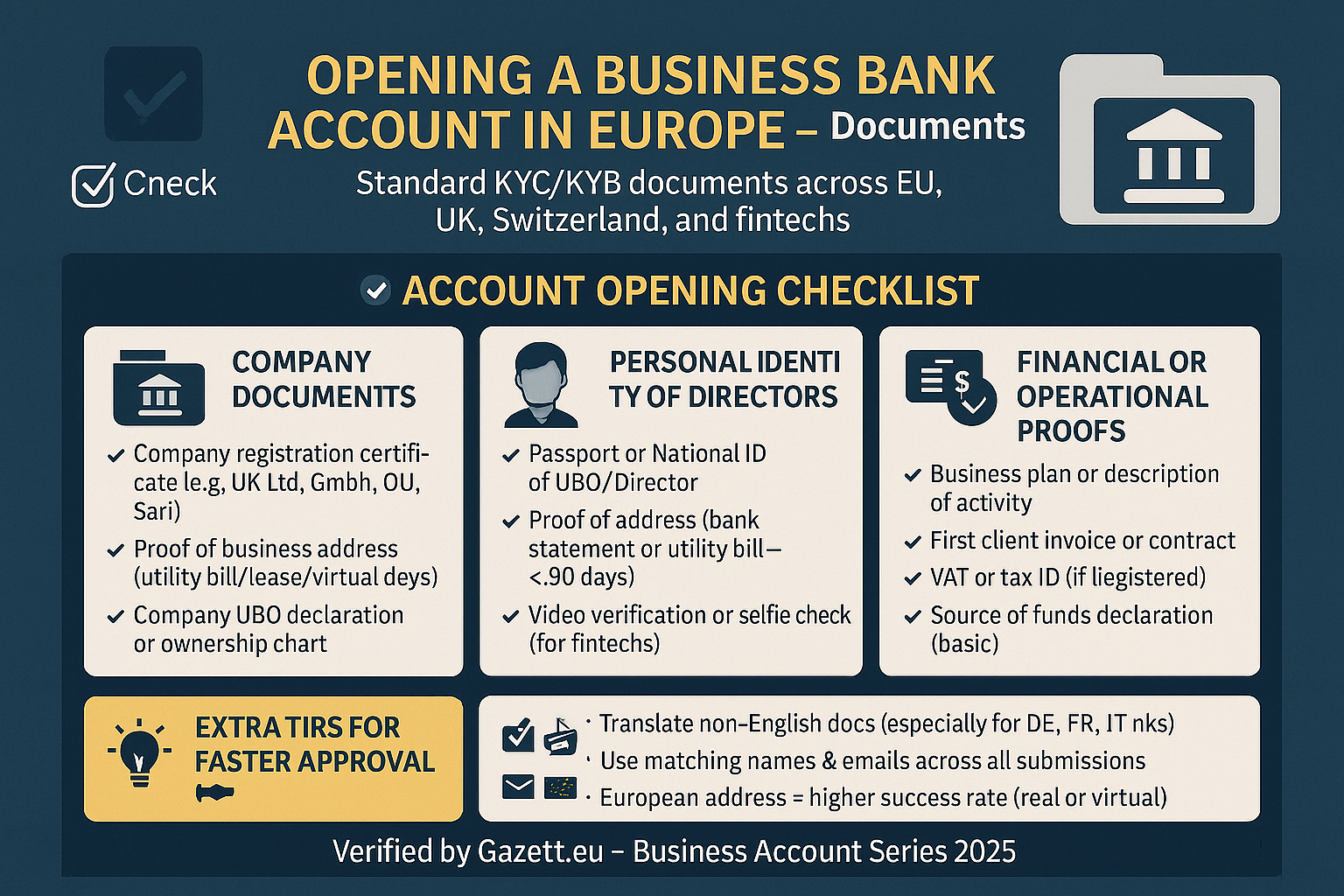
📷 Infographic: Required documents for business bank account setup in Europe | Gazett.eu
Regardless of the country or platform you choose, opening a business bank account in Europe generally requires the following documentation. These ensure KYC/AML compliance, verify your operations, and assess your financial legitimacy.
- Company Formation Documents: Certificate of incorporation, shareholder registry, and company statutes
- Identification of Directors/Owners: Passport, national ID, and (in some cases) tax numbers
- Proof of Address: Recent utility bill, rental agreement, or bank statement (not older than 3 months)
- Business Plan: Short summary of operations, target market, and intended banking usage
- EU VAT / Trade License (if applicable): Required by certain jurisdictions for foreign trade activity
- KYC Questionnaire: Risk profile, source of funds, and beneficial ownership declaration
Some fintechs may request fewer documents (e.g., Wise, Bunq), while traditional banks can require in-person authentication, notarized translations, or director background checks. You can learn more about streamlined EU procedures in our Tax Haven & Treaty Report (2025).
Comparative Matrix + Decision Guide for Entrepreneurs 📊
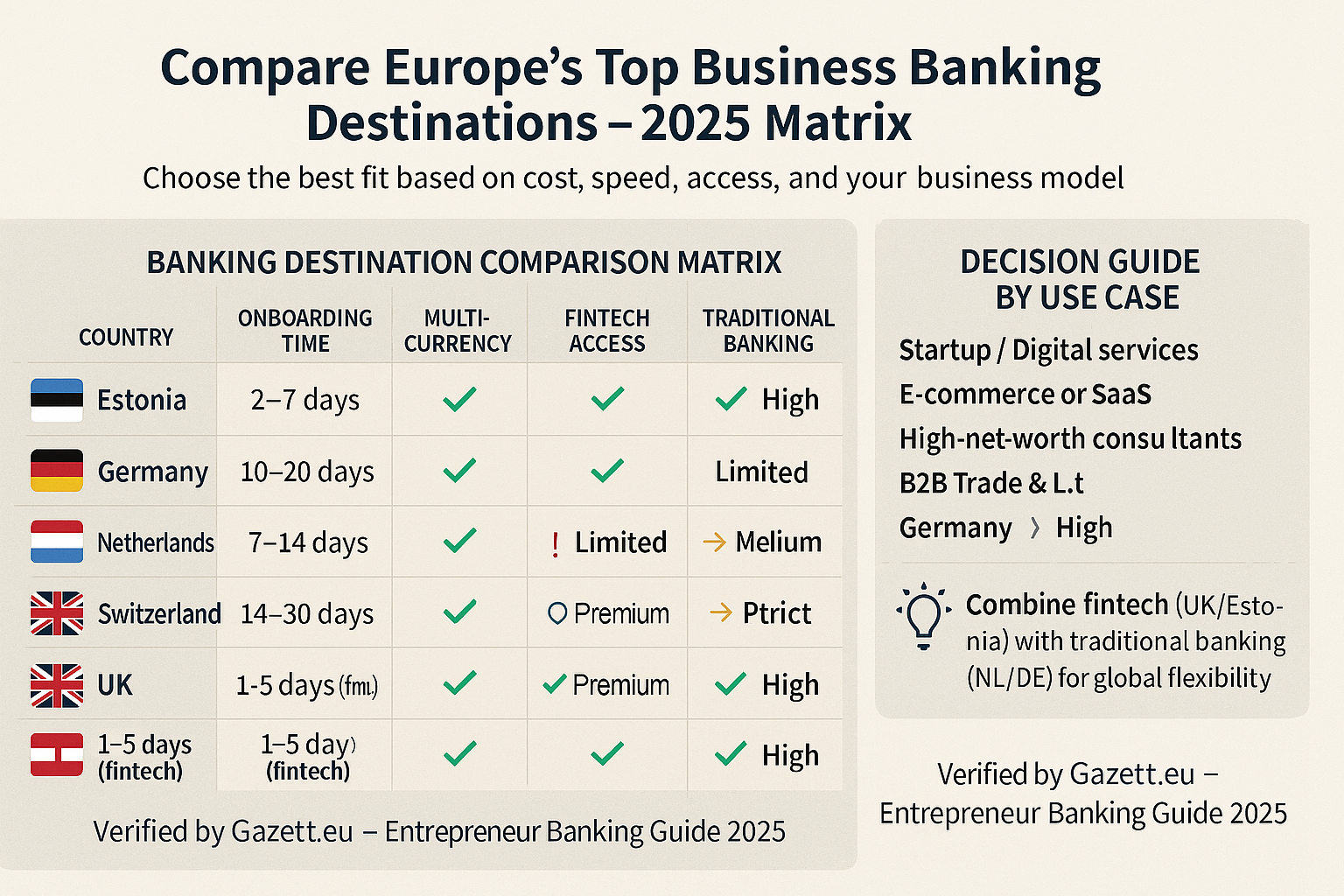
📷 Infographic: Business banking comparison across Europe – best fit by banking needs | Gazett.eu
Use the matrix below to match your startup’s business model, location, or investor profile with the most relevant banking destination in Europe. We’ve factored in account accessibility, fintech presence, multi-currency support, and setup ease.
| Country | Remote Account Setup | Fintech Options | Multi-Currency Support | Average Setup Time | Best For |
|---|---|---|---|---|---|
| 🇪🇪 Estonia | ✅ Yes (e-residency) | Wise, Payoneer | ✅ | 1–2 weeks | Digital Nomads, SaaS |
| 🇩🇪 Germany | ❌ In-person often required | N26, Kontist | ✅ | 2–4 weeks | Established EU Firms |
| 🇳🇱 Netherlands | ❌ Some banks allow online | Bunq, Revolut | ✅ | 2–3 weeks | Cross-border E-commerce |
| 🇨🇭 Switzerland | ❌ In-person often mandatory | Neon (basic) | ✅ | 3–5 weeks | Asset Holding, Trade |
| 🇬🇧 United Kingdom | ✅ Yes (fully online) | Revolut, Tide, Starling | ✅ | 1–3 days | Remote Firms, Agencies |
Use this matrix to narrow your country + platform combo depending on your company’s risk tolerance, product type, and whether in-person travel is an option. We’ll wrap up next with key takeaways, expert tips, and external data references.
Conclusion + Investor Tip + Visual Summary 💼
In 2025, opening a business bank account in Europe is no longer just about documentation — it’s about ease, efficiency, compliance, and adaptability. Whether you’re a SaaS founder managing remote teams, a digital nomad optimizing currency flows, or a cross-border trader needing reliable IBAN access — the European landscape has an option tailored for you.
Countries like Estonia and the UK lead on speed and remote access. Germany and the Netherlands offer robust traditional networks. Switzerland remains unmatched for financial privacy and asset resilience. Choose the banking setup that aligns with your growth model — not just your incorporation.
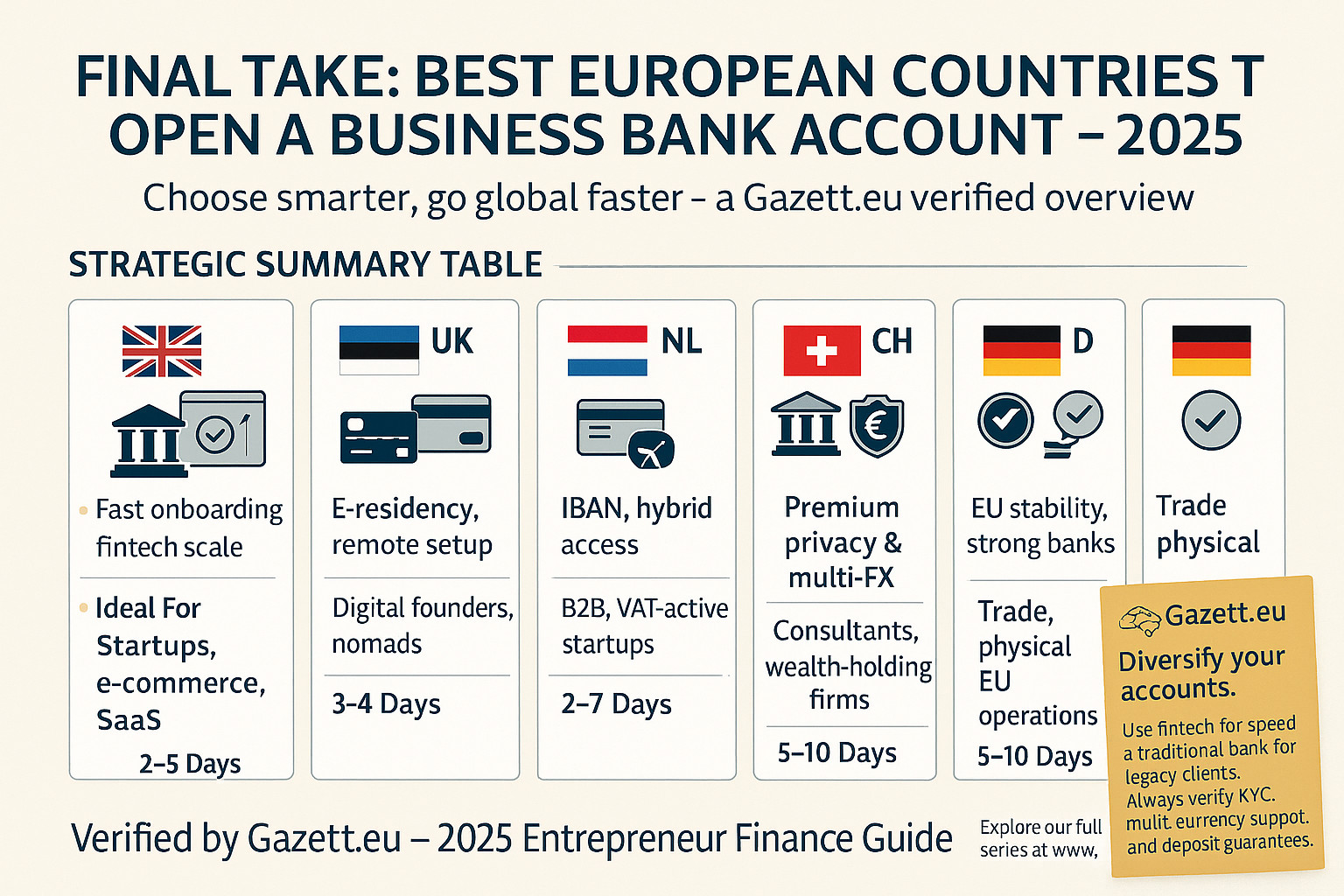
📷 Summary Graphic: 2025 Europe Business Banking Options – Remote Access, Fintech Strength, Traditional Banks | Gazett.eu
💼 Investor Tip: Structure your operations with layered flexibility — use fintech for speed, traditional for compliance. Diversify your accounts by jurisdiction to mitigate geopolitical, FX, or regulatory risks. If targeting the EU+UK simultaneously, UK fintechs plus EU IBANs offer the perfect combo.
Sources: Estonia E-Residency, German Bundesbank, Rabobank Netherlands, Credit Suisse, Revolut Business